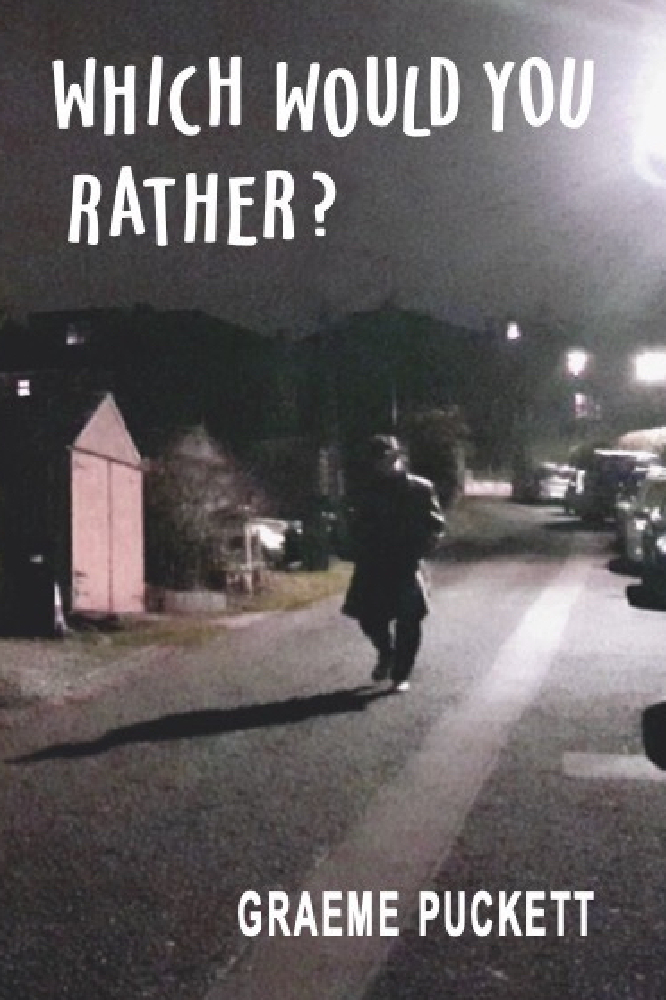
Teaching our swing dance class
Our dance classes are quite varied. It's possible to have a mix of young and old, girls and boys, experienced dancers and complete novices and any combination of these. This means that although we always arrive with a class plan, we frequently have to adjust it depending on who's turned up. I quite enjoy this side of it, though occasionally you're bowled a googly when you have, say, 16 girls and just 2 boys. A few weeks ago, most of the class were of a similar level and fairly experienced, then two Spanish girls turned up. They couldn't speak English and had never danced before. That was a tricky one!
Writing ‘Which Would You Rather?’
I can't pretend to speak with the same experience about writing having only recently seen my first book published. Even using the word writing seems a little far-fetched in that I dictated the entire novel on my phone. I had no plot outlined at all other than to start off by killing my neighbours. Having written the murders, I then added what I thought would be the funniest and most awkward thing to happen next. This left me with a good starting point for the following day's writing. And so it continued. Yes, it’s quite dark – but it is funny.
Similarities between teaching dance and writing novels
The obvious parallels between the teaching situation and the writing of the book were the element of the unexpected and the approach to dealing with these surprising situations. Getting to grips with, and resolving successfully, surprises along the way requires a degree of creativity in both the dance classes and the writing. I would never go into a dance class with a fixed notion of what to teach. Similarly, right from the very start of the book, I knew I didn't want to be limited and restricted by a plot.
Differences between the two disciplines
The big difference, of course, is that teaching a swing dance class is a very social and sociable activity, whereas writing is a solitary exercise. I suppose it's possible to work with others in the case of comedy scriptwriting teams or screenplay writers. Certainly, though, with Which Would You Rather? the whole book writing process was completed on my own in quiet moments. The other obvious difference is that dancing in any form is physically active whereas writing in any form isn't. Although I started the book during a lockdown, we were back teaching by the time it was finished. Having these two different but complementary creativities filling my week made for a wonderfully balanced few weeks.
Sense of humour is vital
The humour in both the classes and ‘Which Would You Rather?’ was a very important element to me. There was a much greater opportunity to push the boundaries when writing, as I could blame Brian, the protagonist. In the dance class, it’s just me saying it. It’s useful and so much fun to find like-minded souls who don’t mind the teasing and give as good as they get. It lightens the class and I’m sure it takes the pressure off.
“It’s wonderful how this class is a talented group of the very best dancers in Somerset . . . and their friend Dave.”
Girls and boys
As with most dance classes, we tend to get more girls than boys. This seems to be because a higher proportion of females experienced some sort of dancing at school whereas very few males had. Girls appear naturally more comfortable dancing and also at helping out with the balance of leaders and followers - quite a few enjoy leading. Several taller girls have told us that at school they were always picked to lead or to take the male roles in school plays. Boys, however, are generally reluctant to dance and specifically reluctant to follow, which, having witnessed it, I think is probably a good thing. Reviews for my book have been from both males and females, so I’m hopeful it has universal appeal!

Which Would You Rather?
A dark comedy starring an incompetent psychopath as the protagonist.
Brian is a troubled and easily irritated man with flexible morals. Passionate about films, he sees film references in everything. As an artist, a surrealist, his love of art, and colour in particular, tend to guide his judgements and decisions.
Many of Brian's challenges in life are a result of an inept social awareness and some fairly politically incorrect ways of thinking. Consequently, these challenges usually lead to even greater dilemmas involving an array of new crimes and misdemeanours for him. Killing three of his neighbours - albeit in record time, of which he is extremely proud, - does little to help Brian's situation. Inclined to lie and cheat his way out of, and into, trouble, his options increase once he has become a killer and the murders have been committed. Now, in Brian's mind, any lesser crime has become acceptable and free to use in his bid to escape detection.
About the author
Having graduated at Bath Academy of Art, Graeme Puckett worked at Butlin's for a season as a portrait artist, where an estimated one in ten customers asked for a refund when their money ran low by the end of the week. He subsequently worked as a freelance illustrator and corporate caricaturist for 25 years. Graeme's work frequently appeared in TV Times, Woman's Realm, Knave, Fiesta and the like, and frequently had to be altered because of art directors who knew better.
In the 1990s, Graeme changed course, when he and his partner Ann started swing dancing and discovered they were good at it. After 18 months they became UK champions and went on to win many more national swing dance awards. As Hoppin' Mad, they've continued teaching and performing Lindy Hop all over the world, and run regular weekly classes in Bath and Bristol. They were the dance consultants for the film 'Chicken Run', which they watch every Christmas to see their names in the closing credits. Graeme and Ann have appeared swing dancing on numerous television shows, most recently the Netflix award-winning series Sex Education.
During the pandemic lockdown, when partner dancing ground to a halt, Graeme kept in touch with his friends by writing to them. By the third or fourth letters, reading between the lines he wasn't receiving, he started to suspect his friends were getting irritated by the obligation to reply. To salvage what friendships he had left, he just started writing for himself.
Tagged in Books author facts

